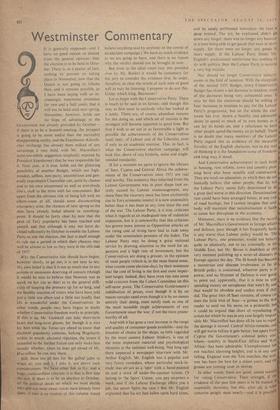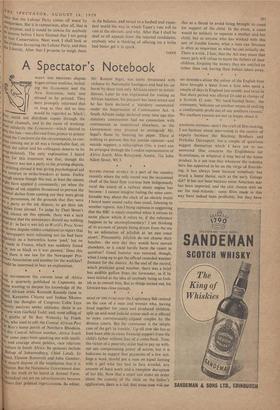Westminster Commentary
IT is generally supposed—and I have no good reason to dissent from the general opinion—that the election is to be held in Octo- ber. There is, as a matter of fact, nothing to prevent its taking place in November, now that the Queen is not going to Ghana then, and it remains possible, as I have been saying with an in- creasingly wearisome insistence for two and a half years, that it will not be held until next spring. November, however, holds out no hope of advantage to the Government not already provided by October— if there is to be a Summit meeting, the prospect is going to be more useful than the inevitably disappointing reality, and the Eisenhower-Khrush- chev exchange has already been milked of any advantage it may hold, with Mr. Macmillan's none-too-subtle suggestion (explicitly rejected by President Eisenhower) that he was responsible for it. Next year, it is true, holds out the glittering possibility of another Budget, which our high- minded, selfless, non-party, unambitious and gen- erally improbable Chancellor can, quite by chance and to his own amazement as well as everybody else's, stuff to the brim with tax concessions. But apart from the obvious risk of being left with no elbow-room at all, should some disconcerting emergency arise, the chances of next spring as the date have already faded almost to vanishing- point. It should be fairly clear by now that the peak of Tory popularity has been reached and passed, and that although it may not have de- clined sufficiently by October to enable the Labour Party to win the election, this fact is itself enough to rule out a period in which their chances may well be almost as low as they were in the ebb-tide of 1957.
Why the Conservative tide should have begun, however slowly, to go out, it is not easy to say. M y own belief is that it is not so much due to any actions or omissions deserving of censure (though it would be nice to believe that Nemesis was as quick on her cue as that) as to the general diffi- culty of keeping the pressure up for so long, and the healthy reaction of voters who have been told just a little too often and a little too loudly that life is wonderful under the Conservatives. In other words, people may have begun to doubt whether Conservative freedom works in principle. If this is so, Mr. Gajtskell can take short-term heart and long-term gloom, for though it is nice for him while the Tories are ahead to know that electoral popularity contains, lurking Hegelianly within its womb, electoral rejection, the lesson if extended to the further future can only make him wonder whether, when he does get ahead of Mr. Macmillan, he can stay there.
Still, these are all hits for the galled jades to wince at; you and I. I take it, are above such considerations. We have other fish to fry, and a huge, coelacanthine creature it is that is first into the pan. If there is to be an election in October, all the political deeds on which we must decide who gets our most sweet voices have already been done. (I take it no student of this column would believe anything said by anybody in the course of an election campaign.) We have as much evidence as we are going to have, and there is no reason why the verdict should not be brought in now.
But even in the ideal court (say one presided over by Mr. Butler) it would be customary for the jury to consider the evidence first. In order, therefore, to clear the minds of such men of good will as may be listening, I propose to do just this. Under which king, Bezonians?
Let us begin with the Conservative Party. There is much to be said in its favour, odd though this may at first seem to anybody who has looked at it lately. There are, of course, abundant reasons for not doing so, and which set of reasons is the strongest will become apparent in good time. But first I wish to set out in as favourable a light as possible the achievements of the Conservatives (and, later, of Labour and of the Liberals), even if only as an academic exercise. This, in fact, is what the Conservative election campaign will look like, shorn of any hysteria, noise and single- minded mendacity.
If for a moment we agree to ignore the abysses of Suez, Cyprus and Central Africa the achieve- ments of the Conservatives since 1951 are real and worthy. The economy they inherited from the Labour Government was in poor shape (not en- tirely caused by Labour mismanagement, any more than the recovery since has been exclusively due to Tory economic tenets); it is now undeniably better than it has been at any time since the end of the war. The Labour Party, it is true, criticises what it regards as an inadequate rate of industrial expansion, but it is noteworthy that this criticism has grown more intense as Opposition attacks on the rising cost of living have had to fade away under the remorseless pressure of the Index. The Labour Party may be doing a great national service by drawing attention to the need for ex- pansion and a high rate of investment, but the Conservatives are doing a greater, in the opinion of most people (which is, in the most literal sense, what counts come election-day), by their insistence that the cost of living is the first and most impor- tant target. Indeed, they have even run into some mild criticism from the Cohen Committee on this self-same point. The Conservative Government's stabilisation of prices, even though it is by no means cornplet eand even though it is by no means entirely their doing, must surely rank as one of the most laudable single achievements of any Government since the war, if not the most praise- worthy of all.
And with it has gone a vast increase in the range and quality of consumer-goods available—and the freedom of choice in the shops, so little regarded by the more austere Labour thinkers, is one of the most important material and psychological elements in the national well-being. Not long ago there appeared a newspaper interview with Mr. Arthur English. Mr. English was a popular and very funny comedian, whose particular stock-in- trade was an act as a 'spiv' with a hand-painted tie and a stock of under-the-counter nylons. ('I belong to •he Spivs' Union; you pay sixpence a week, ano if the Labour Exchange offers you a job, the union fights the case.') But Mr. English explained that his act had fallen upon hard times,
and he rarely performed nowadays—he kept a shop instead. The act, he explained, didn't ao down any longer: there was no longer any humour in a man being able to get goods that were in short supply, for there were no longer any goods in short supply. If the Labour Party thinks Nil-. English's professional misfortune has nothing to do with politics. then the Labour Party is making a very big mistake.
Nor Should we forget Conservative achieve- ments in the field of taxation. With the exception of the second 1955 Budget, every Conservative Budget has shown a net decrease in taxation, most of the decreases being very substantial ones. It may be that the electorate should be willing to bear increases in taxation to pay for the Labour Party's programme, but on the whole the elec- torate has ever shown a healthy and admirable desire to spend as much of its own money as it can lay its hands on, and a reluctance to have other people spend the money on its behalf. There is no doubt that many members of the Labour Party regard this as evidence of the incurable
frivolity of the English character, but to my waY of thinking it is the foundation-stone of freedom, and long may it stand.
And Conservative achievements in such fields as housing, rent reform, town and country plan- ning have also been notable and constructive.
They are weak on education, in which they do not basically believe (fOr other people, that is). but the Labour Party seems fully determined to do a great deal worse in this direction. Denationalisa- tion could have been arranged better, at any rate of road haulage, but I cannot imagine that any' body will maintain that nationalisation is liable to cause less disruption in the economy.
Moreover, there is no evidence that the record of Mr. Macmillan's Government in foreign affairs
and defence, poor though it has frequently been,
is any 'worse than Labour policy would be. The Labour Party, one presumes, would not behave quite so idiotically, not to say criminally, in the Middle East, but Mr. Bevan is doubtless at this very moment polishing up a series of disasters in Europe against the day. The H-bomb has become a monstrous and obscene irrelevance, as far as 14 British policy is concerned, whatever party is in power, and no Minister of Defence is ever going to point out, apparently, that it is time to stop spending money on aeroplanes that won't fly and that would be obsolete and useless even if they did. The great blot of Suez remains, of course (so does the little blot of Suez—a guinea to the first reader to send me his name on a postcard); but it could be argued that short of repudiating an
action for which he was in any case largely respon' sible Mr. Macmillan has done all he can to repair the damage it caused. Central Africa'remains, and will get worse before it gets better; but apart from Cyprus the Government's colonial policy else- where—notably in South-East Africa and N'e't Africa—has been admirable. Unemployment has not reached alarming heights, and is in any ease falling. England won the Test matcheS, the saw mer has been the best for a dozen years, and 1116 grouse are coming over in droves.
In other words, there are good, sound reasons for voting Conservative. Their strength, if the evidence of the past few years is to be trusted. ° essentially domestic, but this, after all, is what concerns people most nearly—and it is precisely
it It
1. here that the Labour Party comes off worst by comparison. But it is comparison, after all, that is my Purpose, and it would be unwise for anybody to assume before I have finished that I am going t° vote Conservative. Next week I shall look at the evidence favouring the Labour Party, and then the Liberals. After that I propose to weigh them
in the balance, and reveal to a hushed and expec- tant world the way in which Taper's vote will be cast at the election, and why. After that I shall be deaf to all appeals from the rejected candidates; anybody who is thinking of offering me a bribe had better get it in quick.
TAPER



































 Previous page
Previous page